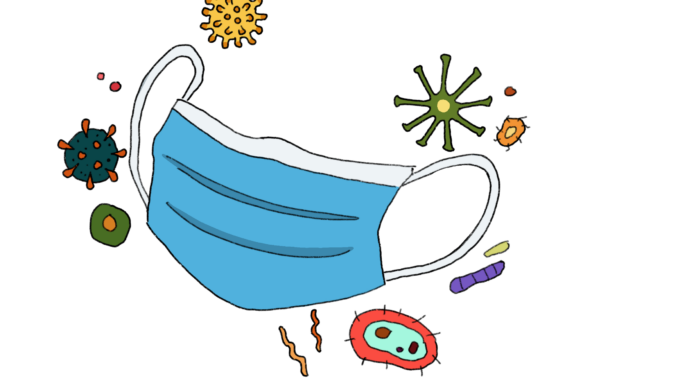
As we transition out of the public health emergency that was the COVID-19 pandemic, the endemic persists, and with it the typical maladies that have plagued the globe for millennia. Yet, just as we overcame the hurdles that living within a contemporary pandemic placed before us, it is imperative that we remain cognizant of the health consequences that all too lax behaviors present.
I am in no way advocating for a return to the national policies put in place to prevent the spread of coronavirus. However, with flu season affecting a large proportion of faculty and students as of late, and midterms in full swing, we ought to ensure the implementation of a few standard practices within our community if we wish to maintain the health or our peers and immunocompromised friends.
Let us say you wound up sick. Perhaps long nights burning the midnight oil made you more susceptible to the inevitable bug, or your eyes were particularly itchy recently. Whatever the case, here are some things we can all do to ensure renewed health and the continuation of such for our broader community.
I will start by beating the dead horse: Please cover your mouth when coughing or sneezing as, according to the CDC, this is the easiest mitigation to implement. With the scientific advancements of the past centuries, we are all familiar with the general etiology of bacterial and viral diseases and this one truly should go without saying.
As elementary as it is, the National Library of Medicine reminds us that a solid soapy scrub between the fingers and nails is one of the most effective ways of mitigating the risk of bacterial and viral infection which can commonly be cut short or overlooked entirely in our efforts to return to books or exams. This can be particularly important, as touching the face is one of the most ordinary ways of catching the common cold.
Secondly, call out sick. I know, missing class or work can be far from ideal, but the truth of the matter is that your professors, peers and employers will all appreciate your proactive steps in increasing their comfort and reducing the spread of illness. I am sure that the community we all hold dear would be pleased to accommodate you by sharing lecture notes and assignment due dates until you recover. An obvious bonus is that you can remain in bed watching “The Tourist,” drinking tea all the while.
When calling out sick proves particularly difficult due to financial stress or other reasons and though all attendance policies should be understanding of such, if you must show up then strap on the mask. Despite naysayers, most contagions such as the coronavirus are spread through droplets which are unlikely to penetrate even a surgical-grade mask according to the National Library of Medicine.
Other students also have things to say when it comes to preventing the spread of disease.
“Drink some fluids, dude. Get some Pedialyte. Being sick is your body’s way of telling you to slow down,” said Miri Mason ’25.
At the end of the day, the occasional sneeze, sniffle or cough in front of others is inevitable, but certain measures can ensure the likelihood of others’ well-being and eschew the dreaded lockdowns of yesteryear.
Subscribe to the Mossy Log Newsletter
Stay up to date with the goings-on at Lewis & Clark! Get the top stories or your favorite section delivered to your inbox whenever we release a new issue.

Leave a Reply